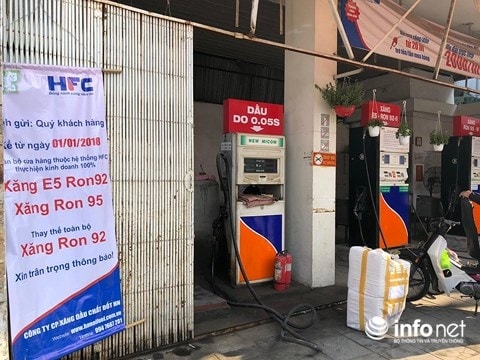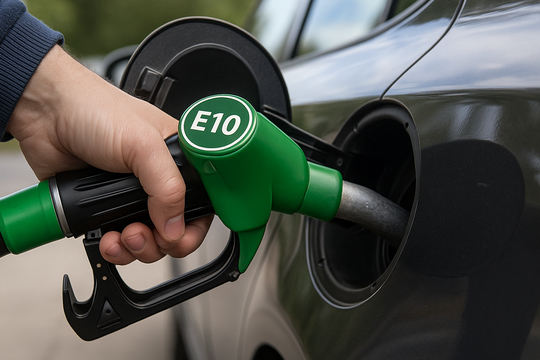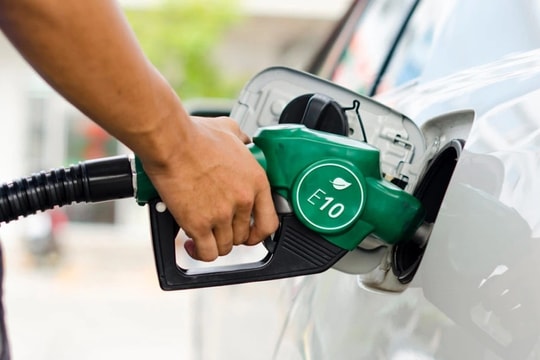Biofuel is widely used in the world.
Vietnam officially replaced all RON92 gasoline with E5 gasoline from January 1, 2018. In the world, bio-fuel is quite popular in the form of E10, some countries have used E85.
 |
| E5 gasoline will completely replace RON92 from January 1, 2018. |
Vietnam identifies roadmap to E10 gasoline
Bio-fuel has been popular in countries around the world for many years. However, in Vietnam, the use of E5 gasoline is just beginning. According to data from the Department of Science and Technology, Ministry of Industry and Trade, the total amount of E5 gasoline sold nationwide from December 2015 to the end of October 2016 was 63,0876m3. This consumption is only 12.15% of the total amount of RON92 mineral gasoline sold.
By January 1, 2018, all RON92 gasoline nationwide will be replaced by E5 gasoline. The Ministry of Industry and Trade has been assigned by the Government to calculate a roadmap and appropriate, feasible steps to replace all RON92 mineral gasoline with E5 gasoline.
The Ministry of Industry and Trade said it will continue the roadmap for implementing the use of E10 gasoline, ensuring it does not affect the production and business activities of traders and the use of people.
Mr. Nguyen Phu Cuong, Director of the Department of Science and Technology, Ministry of Industry and Trade, affirmed at the seminar: "Using E5 gasoline - Safe and effective" about the inevitability of converting mineral gasoline to bio-fuel, reducing dependence on fossil fuels.
Mr. Cuong said that this is an inevitable trend that countries in the region and around the world have implemented.
In Vietnam, the Government has had a preparation roadmap since 2014. Up to now, the transformation is mandatory. The Government wants to ensure energy security, create output for agricultural products and practically protect the environment.
 |
| Fill up with E5 gasoline at the gas station on Lang Ha street |
Biofuel is popular in many countries.
Meanwhile, in countries around the world, this biofuel is quite popular.
Reuters reported that in France, E10 biofuel - containing up to 10% ethanol - has become the best-selling gasoline on the market. E10 gasoline consumption has reached 38.5% of gasoline in the French market.
In some other countries such as Finland, data from the European Ethanol Producers Association (ePURE) shows that the use of E10 biofuel accounted for 63% of the gasoline market in 2016.
E10 is also used in the United States, Australia, and New Zealand. In Brazil, the percentage of ethanol used in gasoline can be as high as 25%. The United States is also moving toward introducing E15. Biofuels are becoming more popular in countries around the world.
"To ensure Europe does not fall behind, E10 should be rolled out widely across member states. This would help complete the internal market for motor fuels and allow European carmakers to reap the benefits of the increase in renewable ethanol in petrol," the association said.
According to the Association's analysis, biofuels help reduce CO2 emissions and other pollutants.
Specifically, a meta-analysis completed by the Vienna University of Technology found that the emissions of the E20/25 blend resulted in higher engine performance and reduced emissions compared to pure gasoline.
Even a gasoline blend with 65% to 85% ethanol, called E85, is widely available in Sweden, France, Germany. It is even more popular in Hungary, Austria, the Netherlands, and Spain.
E85 is highly regarded for its ability to reduce tailpipe emissions, which improves engine performance and reduces heat and engine wear. Because E85 is primarily ethanol, it has a better impact on air quality than gasoline when burned. It reduces carbon monoxide emissions and significantly reduces the emission of toxic substances, including benzene, a known human carcinogen.
However, Reuters also reported that the expansion of biofuel use is threatened by a proposed change to the EU's biofuel policy. The EU is concerned that biofuels could contribute to high food prices and indirectly cause deforestation.
EU regulators have proposed cutting the use of crop-based biofuels, including ethanol, by almost half to a maximum of 3.8% by 2030.
According to Infonet
| RELATED NEWS |
|---|




